Apple's 2019 256GB MacBook Air Includes Slower SSD Than 2018 Model
The 2019 MacBook Air, refreshed last week, appears to have a slower SSD than the 2018 MacBook Air, according to testing by French site Consomac. Using testing with the Blackmagic Disk Speed benchmarking test, the site found that the read speeds of the new SSD are lower.
A test of the 2019 MacBook Air with 256GB of storage demonstrated write speeds of 1GB/s and read speeds of 1.3GB/s. An equivalent model released in 2018 featured write speeds of 920MB/s and read speeds of 2GB/s. While write speeds are on par with the older machine (and are even slightly better), read speeds have dropped 35 percent.

Consomac also saw write speeds of 500MB/s in the 128GB 2019 MacBook Air and read speeds of 1.3GB/s, but this is similar to the performance of the 128GB 2018 MacBook Air as that machine also featured large differences between read and write performance. Higher capacity SSDs were not tested, but may display the same slight decline in performance.
The 2019 MacBook Air features an updated True Tone display and a price drop, starting at $1,099 instead of $1,199. Students are able to get the new machine even cheaper, with the MacBook Air now priced at $999 with educational pricing.
It's possible Apple went with slower SSD performance in order to drop the MacBook Air's price to a more affordable level, and it's not a change that most MacBook Air users are likely to notice in day to day usage of the machine, especially those upgrading from a much older model.
Popular Stories
While the iPhone 17 Pro and iPhone 17 Pro Max are not expected to launch until September, there are already plenty of rumors about the devices.
Below, we recap key changes rumored for the iPhone 17 Pro models as of April 2025:
Aluminum frame: iPhone 17 Pro models are rumored to have an aluminum frame, whereas the iPhone 15 Pro and iPhone 16 Pro models have a titanium frame, and the iPhone ...
Apple may have updated several iPads and Macs late last year and early this year, but there are still multiple new devices that we're looking forward to seeing in 2025. Most will come in September or October, but there could be a few surprises before then.
We've rounded up a list of everything that we're still waiting to see from Apple in 2025.
iPhone 17, 17 Air, and 17 Pro - We get...
A new report from The Information today reveals much of the internal turmoil behind Apple Intelligence's revamped version of Siri.
Apple apparently weighed up multiple options for the backend of Apple Intelligence. One initial idea was to build both small and large language models, dubbed "Mini Mouse" and "Mighty Mouse," to run locally on iPhones and in the cloud, respectively. Siri's...
Apple in October 2024 overhauled its 14-inch and 16-inch MacBook Pro models, adding M4, M4 Pro, and M4 Max chips, Thunderbolt 5 ports on higher-end models, display changes, and more. That's quite a lot of updates in one go, but if you think this means a further major refresh for the MacBook Pro is now several years away, think again.
Bloomberg's Mark Gurman has said he expects only a small...
On this week's episode of The MacRumors Show, we catch up on the latest iOS 19 and watchOS 12 rumors, upcoming devices, and more.
Subscribe to The MacRumors Show YouTube channel for more videos
Detailed new renders from leaker Jon Prosser claim to provide the best look yet at the complete redesign rumored to arrive in iOS 19, showing more rounded elements, lighting effects, translucency, and...
A common complaint about the iPad Pro is that the iPadOS software platform fails to fully take advantage of the device's powerful hardware.
That could soon change.
Bloomberg's Mark Gurman today said that iPadOS 19 will be "more like macOS."
Gurman said that iPadOS 19 will be "more like a Mac" in three ways:Improved productivity
Improved multitasking
Improved app window management...
Apple's upcoming foldable iPhone (or "iPhone Fold") will feature two screens as part of its book-style design, and a Chinese leaker claims to know the resolutions for both of them.
According to the Weibo-based account Digital Chat Station, the inner display, which is approximately 7.76 inches, will use a 2,713 x 1,920 resolution and feature "under-screen camera technology." Meanwhile, the...
Apple's current struggles with Apple Intelligence and Siri began in early 2023 when AI head John Giannandrea sought approval from CEO Tim Cook to purchase more AI chips for development, according to a new report from The New York Times.
Cook initially approved doubling the team's chip budget, but CFO Luca Maestri reportedly reduced the increase to less than half that amount, and instead...
Apple is working on a new version of the Vision Pro with two key advantages over the current model, according to Bloomberg's Mark Gurman.
Specifically, in his Power On newsletter today, Gurman said Apple is developing a new headset that is both lighter and less expensive than the current Vision Pro, which starts at $3,499 in the U.S. and weighs up to 1.5 pounds.
Gurman said Apple is also...
























